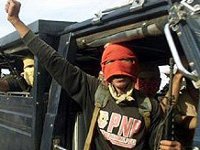Philippine guerrillas invade Malaysia
Malaysia inflicted airstrikes and sent troops to the coastal zone Salah in the north-east of the island of Borneo. For a month a group of Filipino militants of the self-proclaimed Sulu sultanate has been controlling several villages in Malaysia. 40 were killed and dozens wounded in this war. The militants insist on joining the North Borneo to Sulu.

In 2010, 3.1 million people resided in the Malaysian province of Sabah in the north-east of the island of Borneo, of which 800 thousand are from the island of Mindanao that belongs to the Philippines. Mindanao has several Islamic separatist movements, and the largest of them is the Moro National Liberation Front (MNLF). The militants who invaded Malaysia call themselves soldiers of "Royal security force of the Sultanate of Sulu and North Borneo." Their Sultan Jamalul Kiram III claims that Salah belonged to his ancestors for centuries, and he sent his people to restore historical justice.
The Sultanate of Sulu is a historical region that occupies the south-western Philippines and north-west of Malaysia and that developed an Islamic state in the 15th century. In 1658 the Sultanate received Sabah (North Borneo) from the Sultan of Brunei in gratitude for the assistance in suppressing an uprising. In 1878, the Sultan of Sulu leased these territories to the British North Borneo Company, and his descendants continue to receive payments from Kuala Lumpur in the amount of $ 1,700 per year. However, precisely because of the fact that it is only a lease, they (including Kiram III) insist on the return of Sabah. Allegedly, when in 1963 the British returned Malaysia, they mistranslated the word "padyak" in the lease agreement as "concession." The Philippines for a long time did not recognize Malaysian jurisdiction of Sabah, but in 1976, the Philippine President Ferdinand Marcos officially renounced the claims to the province.
Malaysian Defense Minister Ahmad Zahid said that the operation of the armed forces to protect the country's sovereignty was fruitful. However, he later rejected the Filipinos' cease-fire offer. It can be concluded that the rebels continue to hold the coast. The events triggered the worst political crisis in Malaysia and the Philippines in recent decades.
Separatist MNLF did not officially support the actions of Sultan Kiram. Philippine newspapers reported that the Sultan made a desperate move when he realized that his interests in the autonomy were not considered in the negotiations between the MNLF and the Philippine government. MNLF leader Nur Misuari said he did not support the invasion, but he warned the Malaysian authorities to stay away from peaceful Filipinos in Sabah. "Once you are involved, it would be tantamount to a declaration of war against our people and the Moro National Liberation Front," Misuari said.
Manila, like the MNLF, refused to support the self-proclaimed sultanate. The current President of the Philippines Benigno Aquino III urged Kiram to immediately leave the territory of the sovereign state of Malaysia and avoid an international conflict. Aquino is currently in talks with the Moro, and does not needs this confrontation. But the Sultan of Sulu said at a press conference on Tuesday that his people in Borneo, including his son who led the operation, would continue fighting.
On March 6, the UN Secretary General Ban Ki-moon called on the warring parties to stop violence and commence negotiations. Philippine Foreign Minister Albert del Rosario who is trying to resolve the conflict promptly flew to Kuala Lumpur.
The resolution will not be easy. Malaysia conducts a policy of deportation of Filipinos from North Borneo, many of whom consider themselves Sulani. In addition, there are systematical attempts to reduce both legal and illegal influx of Filipino workers in Sabah, and not only from Moro. The flow of immigrants from South Asia and, above all, China, is preferred.
Haji Ahmad Bayam, former chief ideologist of the MNLF, told the Malaysia-Chronicle that the official position of the Moro was inconsistent with the real state of affairs. The MNLF has popular support in northern Borneo and bases with the large arsenal hidden in the mountainous and forest areas of Sabah. He said that many of his friends now go there by boat from Mindanao to support the uprising of the fighters of Kiram III. According to him, judging by the situation in Sabah, there is no way back.
But there are other positions as well. Malaysia-Chronicle reported that the population of the province has been collecting signatures for a petition demanding to leave the residents of Sabah in Malaysia. There is no agreement in the Philippines. A delegation consisting of influential political figures visited the Sultan of Sulu in Taguig City and expressed support for his actions. Former Rep. Satur Ocampo said that President Aquino should review the position of the state, and the former head of the Ministry of National Defense Norberto Gonzales said he supported Kiram.
Lyuba Lulko
Pravda.Ru
Subscribe to Pravda.Ru Telegram channel, Facebook, RSS!


